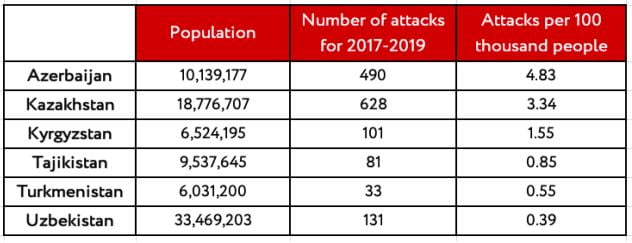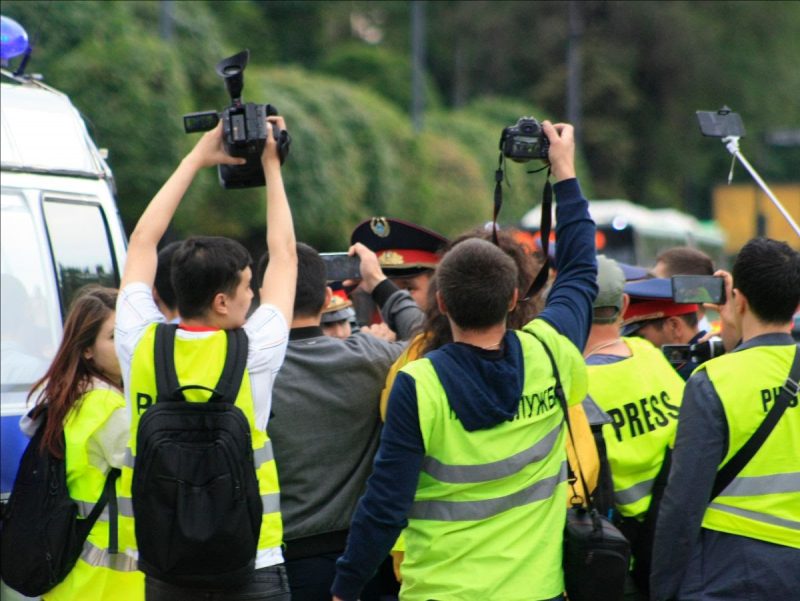State authorities and its representatives were the major source of threats to journalists and media workers in six countries in Central Asia and Azerbaijan, according to a two-year study by Justice for Journalists Foundation.
The London-based NGO analysed 1,464 attacks on professional and citizen journalists, bloggers and other media workers in Azerbaijan, Kazakhstan, Kyrgyzstan, Tajikistan, Turkmenistan, and Uzbekistan between 2017 and 2019.
“Taking advantage of the language barrier, geographical remoteness and low degree of integration of these States into global political and informational agendas, their authoritarian rulers can ‘test’ various methods of applying pressure on journalists with impunity – methods which are then gradually exported to other countries,” Maria Ordzhonikidze, the foundation’s director, said.
Accusing journalists of extremism and connections with terrorists, as well as the criminalisation of defamation laws and violation of privacy, “are widely used in Azerbaijan, Tajikistan and Kazakhstan to silence corruption investigators and opposition-minded journalists and bloggers”, she added.

The report forms part of broader research carried out jointly by the Justice for Journalists Foundation and its partners in 12 post-Soviet countries.
It identified three main types of attacks: physical attacks and threats to life, liberty and health; non-physical and/or cyber attacks and threats; and attacks by judicial or economic means.
All six countries – with the exception of Uzbekistan – registered an increase in the absolute number of attacks between 2017 and 2019. In Central Asia, the main method of attack used was judicial – primarily in the form of detentions, arrests and administrative and criminal proceedings.
When it came to physical attacks, Azerbaijan took the lead by a wide margin with around 26 incidents reported last year alone. “Brutal beatings of journalists in custody are characteristic for this country, even extending to the kidnapping of journalists and their subsequent repatriation from other countries,” the report said.
Kazakhstan ranks first in attacks using judicial or economic means. On average, more than 50 cases are initiated each year in Kazakhstan against media workers on charges of defamation, slander, and causing damage to reputation.
This method was also preferred by a number of Maltese politicians and businessmen against murdered journalist Daphne Caruana Galizia, who at the time of her death, had over 40 pending lawsuits filed against her.
Tajikistan leads the region in the number of media workers accused of extremism, links with terrorists and inciting hatred. Intimidating family members is also characteristic of Tajikistan, including their harassment, interrogation, detention and arrest, according to the report.
Meanwhile, the character of attacks perpetrated against journalists in Kyrgyzstan shifted towards an increase in online threats, via DDoS and hacker attacks on online media outlets.
The report also included Turkmenistan – a country that last year ranked last in the World Press Freedom Index by Reporters Without Borders. The country lost its crown as the worst offender in the 2020 index to North Korea and moved to the 179th place.
The Justice For Journalists Foundation pointed out that it was almost impossible to work as a journalist in Turkmenistan. Information about what is happening in the country is reported to foreign media by “people’s correspondents” who pass on photographs and videos at the risk of being spotted by the extensive national tracking system.
“In the absence of a democratic separation of powers, a lack of police accountability and the dependence of the judiciary on the Executive, professional and citizen journalists cannot count on receiving protection and justice in their countries,” Ordzhonikidze said.
The attention of the international community was the only means of improving their situation and enabling them to continue to work and convey the truth, she added.
Last month, the Justice For Journalists Foundation and Index on Censorship set up a project that monitors and catalogues attacks and violations against the media, specifically related to the coronavirus health crisis.
You can read the report in full here.













